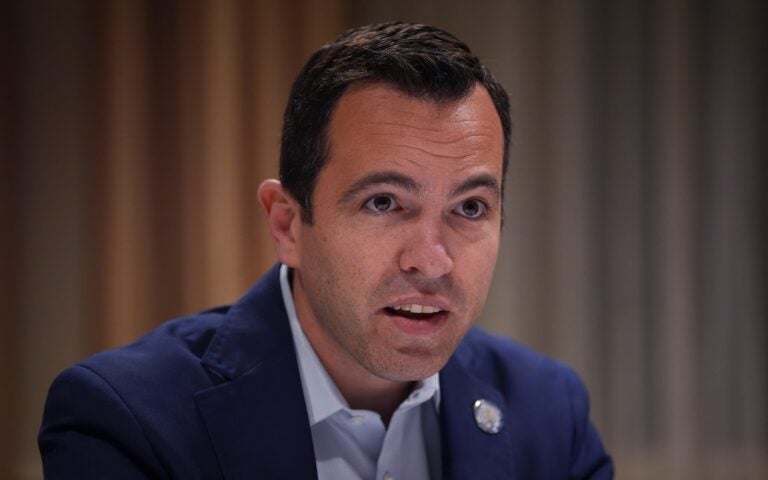N.J. and Delaware join states in suing Trump administration over NIH funding caps on universities and scientists
A National Institutes of Health memo on Feb. 7 said certain grant funds to universities and research institutions would be capped starting Monday.
Listen 1:17
FILE - New Jersey Attorney General Matthew Platkin speaks during an interview with The Associated Press, Nov. 21, 2024, in Philadelphia. (AP Photo/Matt Slocum, file)
From Philly and the Pa. suburbs to South Jersey and Delaware, what would you like WHYY News to cover? Let us know!
A coalition of Democratic state attorneys general, including New Jersey and Delaware, are suing to stop the Trump administration from limiting how universities, medical institutions and research teams can use certain federal funding for health and science studies.
These specific grant funds from the National Institutes of Health refer to reimbursements for “indirect costs” like facility needs, utilities and other administrative expenses, as opposed to direct costs, which can include equipment, salaries, travel and project supplies.
Just several hours after the lawsuit was filed Monday in the U.S. District Court for Massachusetts, a federal judge in Boston ordered that the funding changes be paused. A court date has been set for later this month.
Academic leaders say without the money for indirect costs — which amount to millions of dollars per university or institution — some projects could become delayed or shut down altogether.
Coalition members like New Jersey Attorney General Matthew Platkin called the Trump administration’s cuts unlawful.
“The Trump administration’s attack on public health research funding is a direct attack on our state, which has long led the nation in medical and health innovations that have saved countless lives across our country,” he said. “We will fight this reckless and illegal action in court until this critical funding is restored.”
The NIH announced Friday that federal funding for indirect program and research costs would be capped at 15% for every dollar of grant money that is awarded. But some universities and institutions use far more — up to 50% or 60% — for overhead costs, according to federal officials.
“The NIH is obligated to carefully steward grant awards to ensure taxpayer dollars are used in ways that benefit the American people and improve their quality of life,” the federal agency stated in a memo.
Universities and institutions in Delaware, New Jersey and Pennsylvania receive hundreds of millions of dollars from the NIH every year for research on HIV clinical trials, genetic mutations, congenital heart disease, Alzheimer’s disease and more.
Platkin said Trump’s latest directive in cutting NIH funding would put many of those projects at risk.
“I heard from a lot of our institutions that this was an existential threat to them,” he said. “And it happened overnight with no warning, in violation of the law and without consideration for the harm it would cause.”
The coalition of states suing the Trump administration also includes Arizona, California, Connecticut, Colorado, Hawaii, Illinois, Maine, Maryland, Massachusetts, Michigan, Minnesota, Nevada, New Mexico, New York, North Carolina, Oregon, Rhode Island, Vermont, Washington and Wisconsin.
Platkin said the coalition will argue their position in court and wait for the Trump administration to make changes and take action “through the proper legal channels.”
“[Trump] knows what he’s doing is not legal, and his administration knows, and yet they want to try to cause panic for people who are dealing with cancer or Alzheimer’s, or doing that research. I can’t stomach it,” Platkin said. “It’s not legal, it’s not appropriate and we’re going to stand up and make sure that this doesn’t continue.”
WHYY is your source for fact-based, in-depth journalism and information. As a nonprofit organization, we rely on financial support from readers like you. Please give today.







